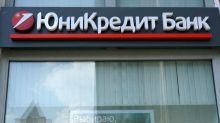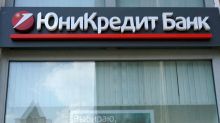UniCredit SpA (CRIN.HM)
| Previous close | 38.71 |
| Open | 38.11 |
| Bid | 37.86 x 0 |
| Ask | 37.97 x 0 |
| Day's range | 38.11 - 38.11 |
| 52-week range | 20.66 - 39.45 |
| Volume | |
| Avg. volume | 330 |
| Market cap | N/A |
| Beta (5Y monthly) | N/A |
| PE ratio (TTM) | N/A |
| EPS (TTM) | N/A |
| Earnings date | 24 Oct 2024 |
| Forward dividend & yield | N/A (N/A) |
| Ex-dividend date | N/A |
| 1y target est | N/A |
 Reuters
ReutersUniCredit drops parts of EU court appeal against ECB's Russia demands
ROME (Reuters) -Italian bank UniCredit said on Thursday it was dropping some elements in its application to the European Court of Justice against a European Central Bank request to reduce exposure to Russia. The decision to amend the complaint to the court and withdraw parts of it follows clarifications UniCredit received from the ECB, the bank said in a statement on its website. "There remain outstanding points within the decision issued by the ECB which require ruling by the ECJ, but upon which UniCredit remains open to constructive dialogue with the ECB in the hope of resolution," the bank added.
 Reuters
ReutersECB scrutinises geopolitical risks for banks after Russia 'lesson'
The European Central Bank's top banking supervisor said on Wednesday she was working on a new framework for assessing how geopolitical risks impact banks, drawing lessons from sanctions on Russia hitting operations of several euro zone lenders. Italian bank UniCredit said on July 1 it had appealed to the European Court of Justice against ECB demands to cut ties with Russia, which is subject to a welter of sanctions from the EU, United States and elsewhere following its invasion of Ukraine. Claudia Buch, who heads banking supervision at the ECB, said that she would not comment on individual banks or actions, but said that Russia was a good example of how the risk landscape for banks has changed.
 Reuters
ReutersUniCredit eyes 2025 targets to cut Russia exposure, no full exit
Italian bank UniCredit said it aims to more than halve loans at its Russian unit by the end of next year to less than 1 billion euros ($1.1 billion), after challenging a European Central Bank request to speed up its exit. UniCredit last month appealed to the European Court of Justice against ECB demands to cut ties with Russia. "We remain determined not to take action that, by breaching local laws and regulation, provide Russia with a justified motive to intervene and take control of our local asset and the value that comes with it," CEO Andrea Orcel told analysts after UniCredit posted better-than-expected first-half results.